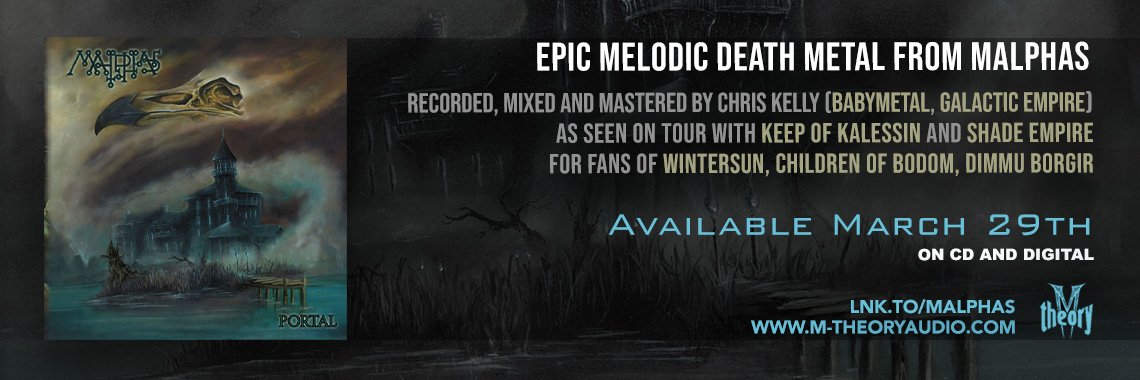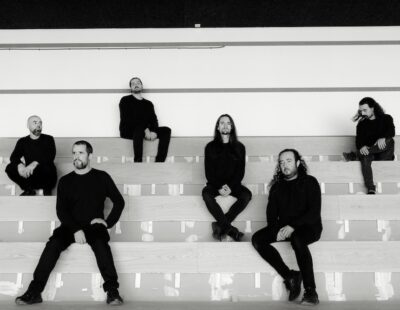
Earlier this year, Decibel caught up with Hellripper architect James McBain to discuss the band’s new album, Warlocks Grim and Withered Hags. His third album under the moniker, Warlocks Grim takes Hellripper’s music in a more melodic—but no less evil—direction. Dedicated Decibel subscribers already got the scoop on the process of making the new record, but there was plenty left from the nearly 40-minute conversation, which you can read below (edited for length and clarity).
To get the full story, pick up the April 2023 issue of Decibel. Warlocks Grim and Withered Hags is out now on Peaceville.
You started the band almost exactly eight years ago to the date, right?
Technically, yeah. The first EP came out January 6, 2015, so of course I’d been writing before that but the official first release was almost eight years ago.
Did you think people would get this into it?
My intention with the EP was just a fun thing to do while I was learning how to write songs and improve my songwriting and learn how to record things at home. I wanted to release an EP and I thought maybe the people in my local scene would hear it and that was kind of as far as I thought it would go. I didn’t think much more would come of it but the music and the band gradually picked up interest from the US and Asia, South America, different labels and zines were writing about it.
I had no expectations when the first EP came out, so it’s really cool.
Speed and thrash metal are often accused of being less original or stuck in the past, so when you’re writing Hellripper stuff—especially since you write pretty quickly—are you trying to change things up?
The writing quickly thing was at the start but gradually I’ve gotten kind of slower. I think that’s coming from trying to make things a bit different, trying to refine ideas, trying to put new things in there takes a bit more time. My main goal always is just to write good songs and it doesn’t really matter if it’s not breaking new ground. Of course that’s always a nice bonus but it’s something that I’ve tried to do more as I release more stuff and as Hellripper kind of progresses.
I think if you listen to the first EP and the first stuff, it’s very simple, kind of metal-punk, Toxic Holocaust influence. Now, if you listen to the new album, it’s a bit more varied, a bit more diverse.
That’s probably the more sustainable approach long-term anyway, not chasing any specific trend or sound.
That’s the main goal. Over the years, especially with this new album, I’ve tried to incorporate a little more influence from other places instead of solely being influenced by the black-thrash, speed, punk type stuff. I’ve tried to bring in stuff from my favorite bands outside that scope, Alice in Chains or the Beatles or something.
This album felt like it has a little more melodic and rock sensibility to it.
While writing this album, I was listening to my usual stuff but I was listening to a lot of classic bands like AC/DC, Black Sabbath, as well as Alice in Chains, even bands like Oasis and Manic Street Preachers, Smashing Pumpkins, the Beatles. Maybe that stuff creeps in. If I hear something I like in their music, I think, “Maybe I can try and put this in a speed metal context.”
I think it’s a lot more guitar-focused as well. There’s a lot more guitar solos, harmonies, things like that.
It feels like Hellripper is moving away from the metal-punk side and developing into a broader metal project.
I think even with the other releases, it always will fall in the kind of speed metal realm. Hellripper will always be a speed/thrash band but I try to incorporate things in there to make it a bit different.
What did the writing and recording process for this look like? You dropped The Affair of the Poisons in the worst part of covid, so was it hard to make yourself care about writing something new?
Kind of. Half of the album was written by the time The Affair of the Poisons came out but once you realize that nothing was happening, there was no touring, vinyl manufacturing was being delayed for sometimes up to a year. It kind of made me slow down, I worked on some other things, I wrote stuff for some other projects that are still in progress. I didn’t want to release another album that would be put out with no touring support and get lost in the mix.
I did slow down and work on other things. I was always writing for Hellripper and I’ve wrote loads of songs that will probably see the light of day at some point, I will re-work them and there are some songs I wrote that I will release but that just didn’t fit on the album. It was just waiting to see the best time to get things done. I sped up throughout 2022, I got everything finished in the first half of the year and submitted it during summer, and then it was just a waiting game again.
It’s always a waiting game, isn’t it?
That was another reason that things were so quick back when I first started. It was all DIY, I just used to record something and basically put it out the next day if I could. Just get everything out as quick as can, I wasn’t aware of the promotion cycle and that kind of stuff.
There’s a lot of Scottish folklore and history involved in the themes of the album. Were there specific stories or ideas you were focusing on with this album?
I’ve always lived in the city my whole life and then I moved to the Highlands, where it’s a bit quieter, about four years ago, just near the end of the writing process for the last album and over the last couple years since staying here, I was inspired by the landscape, the scenery. I’m never usually inspired by my environment but it inspired me to look some more into Scottish folklore. The original idea was to get a few Scottish folklore-based songs and it grew. There was so much cool stories and I decided, “Yeah, I’m just going to do the whole album with the Scottish theme,” which gives it a bit of cohesion. It’s a little bit different for this style of music.
The thing I’m focusing on is the dark side of folklore, so the devil in Scotland and mythical creatures and stuff like that. It’s still fitting with the Hellripper aesthetic, just with the additional twist makes it a bit more personal.
With a speed/black-thrash project, there is a need to make it so that it doesn’t just feel like a total clone of something else.
I wrote a few songs at the start of the writing process and I tried to go in the Hellripper sound and they just sounded uninspired, they sounded like Hellripper songs that weren’t as good as previous songs, so that’s why there’s a bit of more influences in a different direction. I think the Scottish themes and Scottish lyrical content helped me say stuff I haven’t really said before.






